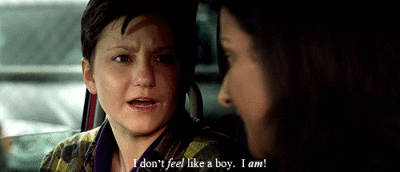Let’s be clear: Degrassi isn’t a masterpiece. You can spot most storylines a mile away, the acting is wildly varied, the dialogue hovers between clunky and unintentionally hilarious, and there is rarely any subtext. But, if you’re looking for hijinks and scandal, you won’t be disappointed (two words: throat gonorrhea). The number of disasters, both tragic and ridiculous, that have befallen the students of Degrassi defies all logic.
But beneath the drama and beyond the camp is Degrassi’s enduring commitment to portraying its teenage characters as multifaceted individuals. They have histories, flaws, challenges, and tendencies that compel us to see them as people rather than examples. Before we know it, we’re putting ourselves in their shoes as they make decisions, mistakes, and progress.
When hot-button “issues” do come up (sexuality, gender identity, teen pregnancy, self-mutilation, bipolar disorder, rape, and death are all topics that have been addressed more than once), they affect characters in which we’re already invested, who have more going on than just this one storyline, and are thus defined by more than this one issue. At Degrassi, no one is safe, but no one is limited to being a token, either.
When Emma Nelson -- who we’ve known from the time she was a 12-year-old environmentalist and outspoken honor student -- copes with the trauma of witnessing a school shooting by flirting with dangerous sexual behavior and developing an eating disorder, it’s not a cliché. It’s a kid we know taking a disturbing turn as she grasps for answers. Emma survives, but she comes out a different person from the one we imagined she’d become back at the beginning. It’s an exercise in watching a character change and accepting the new version of her.
Or take Adam Torres. We’re first introduced to Adam when he hitches a ride to a concert with class president Sav Bhandari (who, incidentally, is struggling with differentiating from his strict parents and good-kid image). Adam, along with his older brother Drew (a cocky football player with a nasty streak), is new to Degrassi. He becomes friends with Eli Goldsworthy and Clare Edwards (who are circling a romance). The three hang out and work on school projects together. Adam is mischievous, spontaneous verging on irresponsible, and smart. He has an offbeat sense of humor and a knack for calling out his friends on their BS.

It isn’t until Adam’s fifth episode that we’re introduced to his home life, and we learn that he is a transgender boy. By the time this part of his story -- still a secret to everyone at Degrassi -- is revealed to us, it’s one element in the context of a larger whole. We’ve already characterized Adam, based on several unrelated storylines.
This can be a powerful experience -- having something society might deem a person’s defining trait revealed only after we’ve already formed our opinions based on the content of that person’s character. In Adam’s case, the reveal to the audience is a gentle one, and his storyline progresses from there much the way any other kid’s would, its universal problems, thrills, and heartbreaks made new by the particulars of the character. Adam gets himself into trouble, experiences misunderstanding, and feels the pain of first love just like everyone else.
Simultaneously, Degrassi doesn’t back away from delving into the specific conflicts Adam faces as a transgender teen. His identity is revealed at school by an ignorant bully. He faces harassment and violence, as well as more subtle forms of bigotry. He handles these challenges with the blend of preternatural grace and impulsive explosiveness that is unique to him -- and, importantly, we see him do it and hear what he has to say. When, in “My Body Is A Cage,” his mother asks him to dress up as “Gracie” to make his grandmother feel more comfortable, we feel the hit right along with him. Because we know Adam. And Adam isn’t Gracie.
While Adam’s story might be the first one of its kind on the show, in many other cases, Degrassi normalizes a wide range of human experiences by recycling them, keeping the plots fresh by focusing on the distinct characters involved. We see stories, not politics; characters, not avatars. Manny Santos’ unplanned pregnancy is unique from Liberty’s, from Mia’s, from Jenna’s. Marco del Rossi’s experience of grappling with his sexuality is different from Paige’s, from Alex’s, from Riley’s, from Tristan’s.



